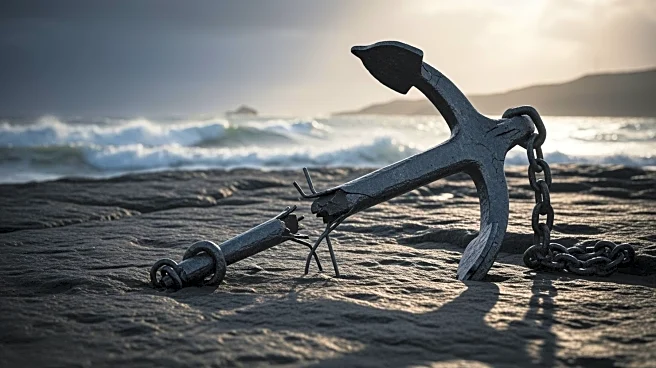What's Happening?
Muhammad Pahlawan, a Pakistani national, has been sentenced to 40 years in prison by a federal judge in Virginia for his involvement in an arms smuggling operation that resulted in the deaths of two Navy
SEALs. The incident occurred in January 2024 when U.S. Navy forces intercepted a dhow off the coast of Somalia, which was transporting Iranian-made weapons to Houthi militants in Yemen. During the raid, Chief Petty Officer Christopher Chambers and Petty Officer 1st Class Nathan Gage Ingram drowned while attempting to board the vessel. Pahlawan was convicted on multiple charges, including providing material support to a foreign terrorist power and conspiracy to provide material support to terrorists. The operation involved smuggling weapons components from Iran to Yemen via Somalia, with Pahlawan coordinating ship-to-ship transfers and receiving payments for his role.
Why It's Important?
This sentencing highlights the ongoing security challenges in the region, particularly the flow of weapons to Houthi militants in Yemen, which has implications for regional stability and U.S. military operations. The case underscores the risks faced by U.S. military personnel in countering arms smuggling and the broader geopolitical tensions involving Iran's support for the Houthis. The deaths of the Navy SEALs also bring attention to the operational hazards and the need for improved training and equipment for such missions. The involvement of Iranian-made weapons further complicates U.S.-Iran relations and the broader Middle East conflict dynamics.
What's Next?
The sentencing may lead to increased scrutiny and efforts to curb arms smuggling routes in the region. U.S. military and intelligence agencies might enhance their operations to prevent similar incidents and ensure the safety of personnel involved in such missions. Additionally, there could be diplomatic repercussions as the U.S. continues to address Iran's influence in Yemen and its support for the Houthis. The case may also prompt a review of training and equipment protocols for Navy SEALs to prevent future tragedies.
Beyond the Headlines
The incident raises ethical and operational questions about the conduct of military operations and the balance between mission objectives and personnel safety. The posthumous recognition of the SEALs' bravery highlights the personal sacrifices made by military personnel, while the investigation into their deaths points to systemic issues that need addressing. The case also reflects the complex web of international relations and the challenges of enforcing international law in conflict zones.










